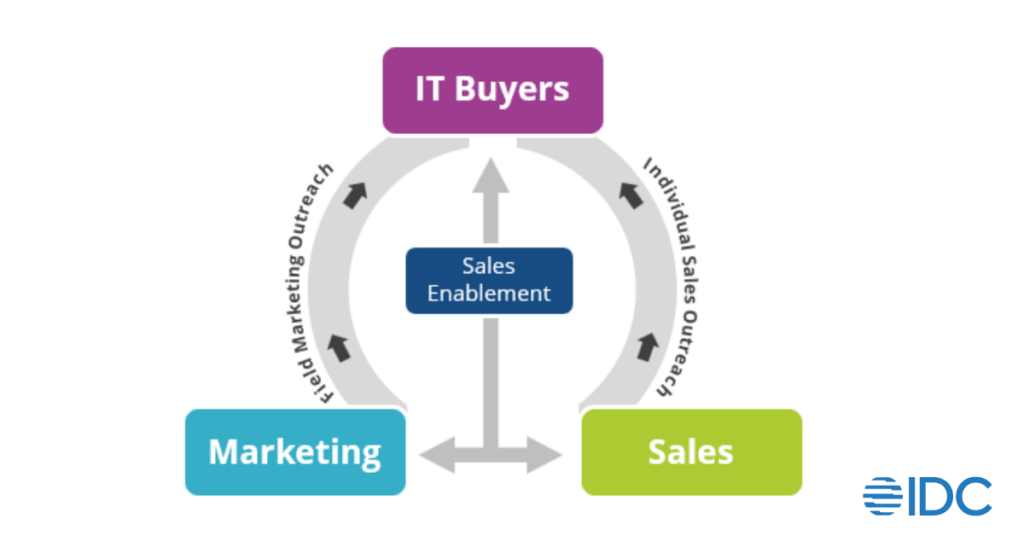Sales teams today are in a period of transitioning. They are used to selling horizontally, targeting IT departments and emphasizing product features and benefits. However, their role is rapidly evolving due to transformative shifts in the technology industry, changing buyer behaviors, the emergence of diverse personas, and an increasing demand for a value-based and outcome-oriented approach.
In this dynamic landscape, having a robust sales enablement strategy and leveraging effective sales enablement tools becomes paramount in ensuring that sales teams are equipped with the necessary strategies, tools, and insights to navigate this transformation seamlessly.
As sales professionals adapt to this evolving landscape, a comprehensive sales enablement strategy and the right sales enablement tools, become a practical guide, steering them towards success.
Understanding Sales Enablement
Sales enablement exists to enhance the effectiveness of sales teams. Sales Enablement professionals focus on the strategic alignment of sales and marketing efforts through the implementation of processes, tools, and content. This critical function ensures that the right information reaches the right people at the right time, enabling tech sales representatives to engage with prospects in a meaningful and personalized manner.
Did you know IDC has a Sales Enablement practice? It was created to empower organizations to sell more effectively and to connect and align marketing and sales efforts. Is IDC’s Sales Enablement Practice for you?

12 Key Outcomes of Sales Enablement
Sales and Marketing Alignment: A harmonious synergy between sales and marketing teams leads to consistent messaging, efficient lead handoffs, and unified customer experience, eliminating any discrepancies between marketing efforts and sales engagements.
Messaging Continuity: The consistent delivery of messaging across diverse touchpoints establishes brand credibility and enhances customer trust, ensuring that the company’s narrative remains coherent and impactful.
Seamless Buyer Journey: Mapping the buyer journey and providing tailored content at each stage nurtures prospects effectively, guiding them through their decision-making process with relevant information.
Higher Yield on MQLs Received by Sales: Empowering sales teams to effectively nurture and convert Marketing Qualified Leads (MQLs) bolsters the return on marketing investments, transforming potential leads into valuable customers.
Elevated Above-the-Line Conversations: Equipped with insights and tools, sales representatives engage in strategic discussions that transcend product features, focusing on delivering value and solving overarching business challenges.
Industry and LOB Persona Relevant Conversations: Customized content and messaging tailored to specific industries and Lines of Business (LOBs) resonate more deeply, forging connections that are conducive to conversion.
Navigating Multi-Stakeholder Selling: In intricate B2B sales environments, sales enablement empowers reps to navigate diverse stakeholders adeptly, aligning their pitches to address individual needs and concerns.
Cultivating Larger Transformative Deals: With a thorough grasp of customer pain points and solutions, sales enablement equips reps to articulate the value of substantial, transformative deals persuasively.
ROI and Value Conversations: Armed with pertinent tools and data, sales reps engage in meaningful dialogues about the anticipated Return on Investment (ROI) and the value proposition, instilling confidence in potential buyers.
Accelerated Pipeline Progression: Optimized processes and resources provided by sales enablement lead to streamlined pipeline progression, minimizing bottlenecks, and expediting the sales cycle.
Enhanced Conversion Ratios: Through focused training and content, sales enablement enhances conversion ratios by empowering sales representatives to adeptly address customer objections and concerns.
Effective Loyalty Management: Beyond closing deals, sales enablement promotes enduring customer loyalty through continuous value delivery, bolstering customer satisfaction and driving repeat business.
The role of sales enablement has transcended its supporting function to become an indispensable strategic driver of revenue growth. A well-structured sales enablement strategy, supported by purposeful tools, can align an organization’s sales and marketing efforts effectively, nurture customer engagement, and guide prospects through a seamless journey that culminates in higher conversions and enduring customer relationships.




